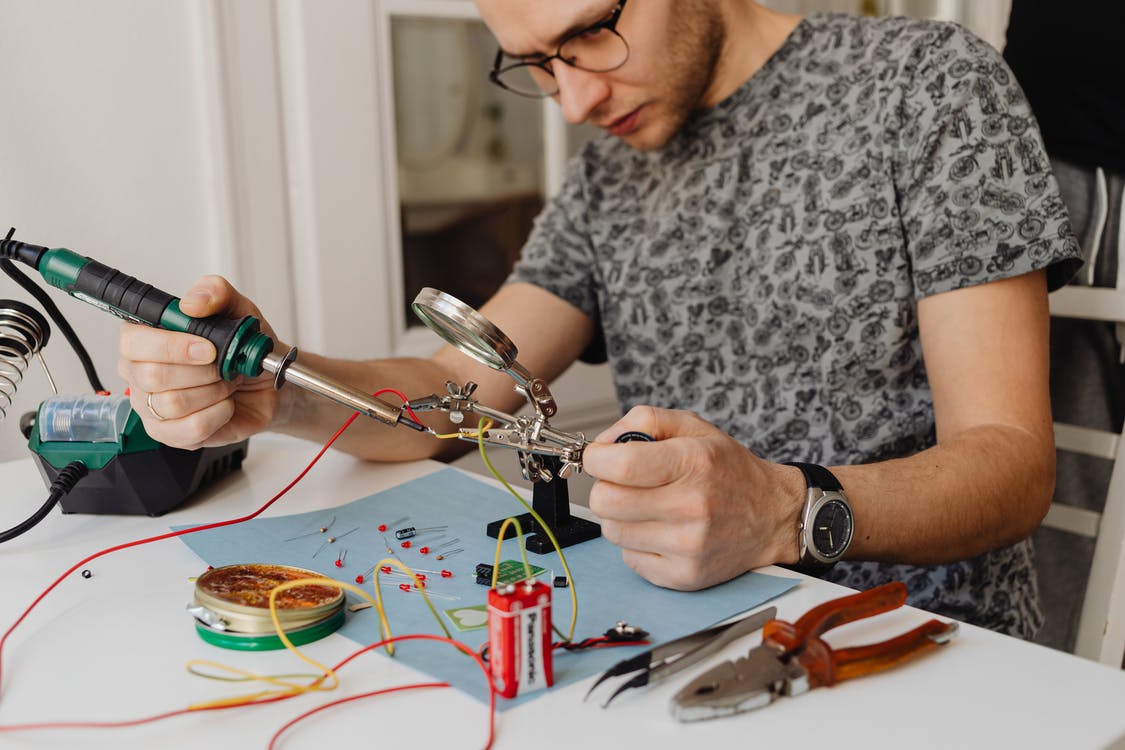How to learn electronics if you've never done it before? This guide will help you go from a complete zero to an intermediate to advanced level. You will be able to fix electronic equipment. Each step is described.
Study school physics, including such sections and concepts as electrostatics, electrodynamics, Ohm's law, Kirchhoff's rule, voltage, resistance, current, charge, inductance, capacitance, capacitor (of two conductors and one), resistor, inductor, transformer (optionally still diode, transistor, if this is studied in school), power, Joule-Lenz law.
Study of university physics and electronics: theoretical foundations of electrical engineering, continuum electrodynamics, field theory (what is the rotor, gradient, divergence), Maxwell's laws. If you need to prepare a physics essay, but at this stage, you have difficulties you can pay someone to write a paper at a specialized service. The best writers will help you cope with the task faster. Besides, this service is one of the best for writing research papers. Be sure the professor will highly appreciate your paper.
Reading entry-level electronics literature
Intermediate and advanced level literature:
• Horowitz, Hill The Art of Circuitry (preferably 3rd English edition in the original;
• Titze, Schenk -- Semiconductor Circuit Engineering (1982 and 2008, preferably both editions)
• Henry Ott, "Interference and Noise Suppression Techniques in Radio Equipment."
• Johnson G. Graham M. "Designing high-speed digital devices. A Basic Course in Black Magic".
• David M. Harris and Sarah L. Harris -- Digital circuitry and computer architecture
And some books on microcontrollers and microcontroller programming.
Looking at stuff on the Internet
Read datasheets - technical documentation of electronic components, chips, or communication standards (rs232, uart, i2c, can). Start with a simple printed circuit board and look at the name of the parts. Look for the datasheet and read it to find out how the circuit board works.
The practical side - assemble circuits, etch and solder boards (photoresist), build circuits on breadboards, buy electronic components and devices, etc.

What do you need to do to get started?
To get started you will need:
- A soldering iron with temperature control (soldering station) and interchangeable jaws, solder, and flux. The higher the temperature, the faster the solder melts, but at the same time it oxidizes faster and becomes non-working (the flux makes it work again, but not for long). The optimum temperature is 300-340 degrees.
- Multimeter, laboratory power supply with voltage and current regulation.
- fiberglass foil (which is used to make printed circuit boards), ammonium persulfate (the chemical used to etch circuit boards. I don't recommend chlorinated iron -- it stains things very easily and you can't see the etching state in it without taking the board out), breadboard, wire
- tweezers
- a USB microscope if you solder or repair small things (e.g. SMD chip pins sized 0603 or smaller, micro-USB connectors, BGA chips). Preferably on an upright tripod.
You can start with a simple circuit like a flip-flop or something simple like that. There are lots of circuits on the Internet. You can enroll in a radio or robotics class.
Work with computer programs for electronics:
- for the layout of tracks (trace) on printed circuit boards - sprint layout, easyEDA, diptrace, NI Ultiboard, Altium designer, Proteus
- for schematics - Proteus, ...
- for the simulation of the behavior of circuits - Proteus, NI Multisim (by the way, it can replace the manufacture of circuits in the physical form, you can just make a circuit on the screen and see how it works. There are a lot of virtual instruments there - multimeter, oscilloscope, etc. And if you need to solder a complex circuit, you can debug it in the simulator beforehand and avoid mistakes.)
You do not have to do it all in the order above (I numbered it just for convenience), you can do it all in tandem.
Learning electronics is not an easy task. Some people start getting into it at school age. Others find it interesting at a mature age. It is usually easier for children to learn something new. Schoolchildren are happy to take physics classes and call it their favorite subject. Others can't understand anything in this field and every class is a torment for them. And doing homework on a subject they don't understand is stressful. For such assignments would be better for you to contact the best college essay writing service for help. In the meantime, you can do other tasks. Develop in the areas that interest you. Thus you will achieve great success.
Good luck!








